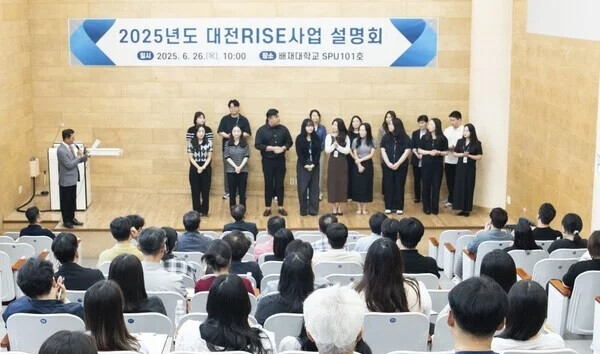
DAEJEON, South Korea – Pai Chai University announced on June 29 that it has established a collaborative development model between the university and the local community to align with the government's Regionally Innovative University Support System (RISE). The Pai Chai University RISE Project Group unveiled its RISE model, which aims to cultivate practical, specialized talent leading regional industrial growth.
This initiative comes in response to Daejeon Metropolitan City's five key RISE objectives: promoting region-leading university education specialization, revitalizing local settlement through employment and entrepreneurship, advancing sustainable industry-academia-research cooperation, strengthening lifelong and vocational education for all ages, and resolving regional issues to accelerate RISE. Daejeon City's comprehensive RISE plan, titled "Establishment of an Education Innovation Industry-Academia-Research-Government Cooperation Ecosystem for Realizing Daejeon as an ABCD+QR Economic Science City," encompasses five major projects and twelve unit tasks, with a substantial budget of 64.3 billion KRW allocated for 2025. The city successfully secured an additional 12.4 billion KRW in national funding by being recognized as a top-tier local government for its RISE system establishment and operational excellence. A total of 13 universities in the Daejeon area, including Pai Chai University, are participating in this 65.5 billion KRW RISE project, which seeks to foster shared growth between the region and its universities through industry-linked university innovation.
In response to these directives, Pai Chai University is focusing on several key areas: nurturing future talent, offering "Early Bird Employment Support," activating regional settlement, fostering industry-academia cooperation through local resources, promoting inter-university educational cooperation, enhancing lifelong education for citizens, establishing a settlement-friendly city for international students, and addressing local issues while contributing to Daejeon’s "Honey-jam City" initiative.
A specific example of their strategic programs is the "Early Bird Employment Support," which involves executives and employees from partner companies collaborating with academic advisors and students on career counseling. This program integrates industry demands with the university's employment support, fostering the development of highly practical and competent individuals.
Furthermore, Pai Chai University is committed to expanding lifelong education opportunities for citizens. This includes operating the "Lifelong Education Convergence Department," specifically designed for students aged 30 and above or those with over three years of work experience post-high school. This department offers diverse specializations such as Total Life Styling, Total Life Care, and Local Small Business, aiming to become a pivotal hub for lifelong learning. The university also plans to establish a "Daejeon-type Community College," further solidifying its role in providing accessible and relevant education to the community.
Pai Chai University's commitment to the RISE initiative extends beyond financial support; it signifies a comprehensive integration of the university's capabilities with regional society to build an innovative model. This collaborative effort between Pai Chai University and Daejeon Metropolitan City is poised to drive sustainable regional development and cultivate a skilled workforce essential for future industrial prosperity.
[Copyright (c) Global Economic Times. All Rights Reserved.]




























